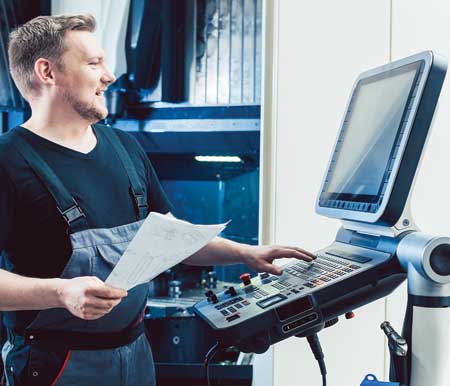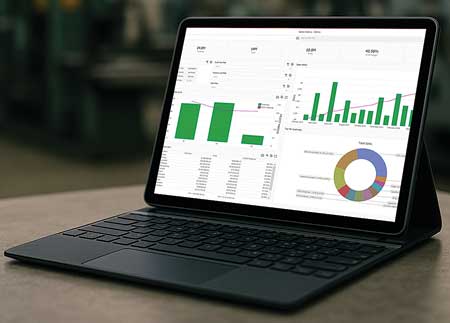
By integrating with shop floor equipment, ERP automates scheduling and resource allocation, helping manufacturers minimize idle time and maximize the use of labor, machines and materials.

ERP dashboards from Global Shop Solutions provide real-time visibility into costs and performance, giving manufacturers the insights they need to make smarter decisions faster.
Cutting costs is nothing new in manufacturing. What is new is having to do it while juggling labor shortages, supplier delays and tighter customer demands. Lean principles like reducing waste and optimizing workflows still matter-but they are no longer enough on their own. Staying competitive now means finding smarter ways to protect quality and keep production moving without burning through resources.
To do so, manufacturers are turning to smart enterprise resource planning (ERP) systems that go beyond traditional lean methods. By integrating real-time data analytics, automated resource management, quality control and inventory optimization, ERP has the ability to drive significant cost reductions while simultaneously improving quality and productivity.
Beyond Lean: How ERP Helps Cut Costs Without Compromise
While lean manufacturing has helped refine operations for decades, its effectiveness is often limited by siloed data, manual processes and a lack of end-to-end visibility. That is where ERP comes in. By unifying all aspects of production, finance, inventory and customer service in a single system, ERP removes the disconnect between departments and gives teams access to real-time insights that lean alone cannot provide. The result is lower costs across the board, without sacrificing quality, speed or customer satisfaction.
Here is how it works:
- Data-driven lean practices: ERP strengthens lean initiatives by providing real-time visibility across the entire organization. Instead of relying on manual tracking or isolated spreadsheets, users can monitor performance metrics, production timelines and supply chain activity in one unified system. With ERP, lean becomes a living process, constantly optimized through accurate, up-to-date information.
- Smart resource management: Maximizing labor, equipment and materials is essential for cost control. ERP automates production planning and scheduling, ensuring the right resources are allocated to the right jobs at the right time. This reduces idle time, avoids overstaffing and ensures machines run at peak efficiency.
- Reduced administrative overhead: ERP eliminates the need for redundant data entry and time-consuming paperwork. Instead of managing work orders, inventory and invoices in separate systems (or on paper), ERP consolidates these functions into streamlined digital workflows. This cuts down on errors, speeds up approvals and frees administrative staff to focus on higher-value work.
- Real-time cost tracking: With ERP, users can see actual job costs as they occur rather than after the fact. This includes labor, materials, overhead and even vendor pricing trends. Having real-time insight into costs helps businesses identify overruns, make corrections quickly and protect margins.
- Targeted waste reduction: Scrap, rework and downtime are all costly forms of waste. ERP minimizes them by integrating quality control into every stage of the production process. Users can set up inspections, capture nonconformance reports and track trends that impact product quality. Better visibility means fewer surprises and fewer costly mistakes.
- Optimized inventory management: Carrying too much inventory ties up cash; with too little, you risk missed deadlines. ERP helps strike the balance by aligning purchasing and production with real-time demand forecasts and stock levels. Features like automated reordering and vendor lead-time tracking help ensure materials are available when needed without overstocking.
- Automated, accurate data: Less time spent on data entry means more time for value-added tasks. ERP systems automatically capture data from machines, barcode scanners and shop floor terminals, reducing labor costs while improving data accuracy.
The result? Faster decisions, fewer errors and a more productive workforce.
Real Manufacturers, Real Results
Following are manufacturers who found ways to cut costs and work smarter by leveraging ERP. Without sacrificing quality, capacity or customer satisfaction, they used the software as a foundation for better decisions, tighter operations and long-term growth.
- Gemini Plastics, Inc.: Located in Fallsington, PA, Gemini Plastics is a family-owned custom injection molder of thermoplastics, specializing in make-to-order products for electronics, industrial and commercial markets.
Before ERP: The company relied on spreadsheets and manual processes to manage production, inventory and costing. As the company grew, this approach caused inefficiencies, delayed orders and made it difficult to deliver accurate job costs. Lack of integration also limited visibility across the shop floor and made quoting inconsistent.
After ERP: Gemini Plastics automated job routing, BOM creation and inventory tracking to cut down on manual work and reduce delays. With real-time cost visibility and accurate tracking of labor and materials, it improved job costing and gained better control over pricing and margins. Custom reporting and streamlined processes also helped them work leaner, deliver faster and scale more efficiently.
- Corsair Electrical Connectors, Inc.: Based in Irvine, CA, Corsair Electrical Connectors is a privately held contract manufacturer specializing in producing military and commercial aircraft and aerospace connectors for value-added distributors, OEMs and the U.S. government.
Before ERP: Corsair Electrical Connectors managed complex, made-to-order production using spreadsheets and disconnected systems. This led to inefficiencies in purchasing, scheduling, inventory control and communication, often delaying jobs, inflating inventory and limiting visibility into real-time operations.
After ERP: The company centralized operations, automated job tracking and streamlined purchasing and production planning. Real-time data helped reduce past-due jobs, improve on-time delivery and enhance traceability. The company also optimized inventory and labor management and reduced financial errors and manual data entry resulting in faster workflows, stronger data integrity and improved communication.
The right ERP system can help businesses cut costs and boost productivity without sacrificing quality or capacity. ERP does not just solve problems; it builds a stronger, leaner manufacturing operation.
A Roadmap to Simplify and Succeed with ERP
Ready to start cutting costs while maintaining your edge in quality and capacity? Here is a simple roadmap to help companies embrace ERP effectively:
1. Start with a self-assessment. Identify inefficiencies in production, inventory, administrative tasks and cost control. What is costing you time or money today?
2. Set clear goals. Define what success looks like. Some examples include reducing lead times, cutting scrap or automating scheduling.
3. Choose an ERP built for manufacturers. Look for an ERP platform that offers industry-specific tools, applications and support.
4. Involve key users early. Engage team members from production, finance and operations to ensure buy-in and smooth adoption of your ERP.
5. Begin with the basics. Start with core functions, like job costing, inventory management and scheduling, expanding your software application toolkit as needed.
6. Leverage training and support. Invest in ERP training to ensure your team understands the system and uses it to its full potential.
7. Track progress and refine. Use ERP reporting tools to monitor KPIs, uncover new savings opportunities and continuously improve operations.
By following these steps, companies can simplify ERP adoption and unlock its full potential.
Smarter Manufacturing Starts with ERP
"With the right approach, ERP becomes more than a system, but rather a strategic driver of growth, efficiency and long-term success," said a company spokesperson. "Implementing a modern ERP system unlocks the ability to cut costs, eliminate waste and boost productivity, all while maintaining the high quality and capacity your customers expect. "Ready to take the next step? Discover how you can simplify your manufacturing and grow with confidence. Learn more about Global Shop Solutions and schedule your free ERP software demo today."
Authored by Global Shop Solutions, Inc.
For more information contact:
Global Shop Solutions, Inc.
975 Evergreen Circle
The Woodlands, TX 77380
800-364-5958
www.globalshopsolutions.com